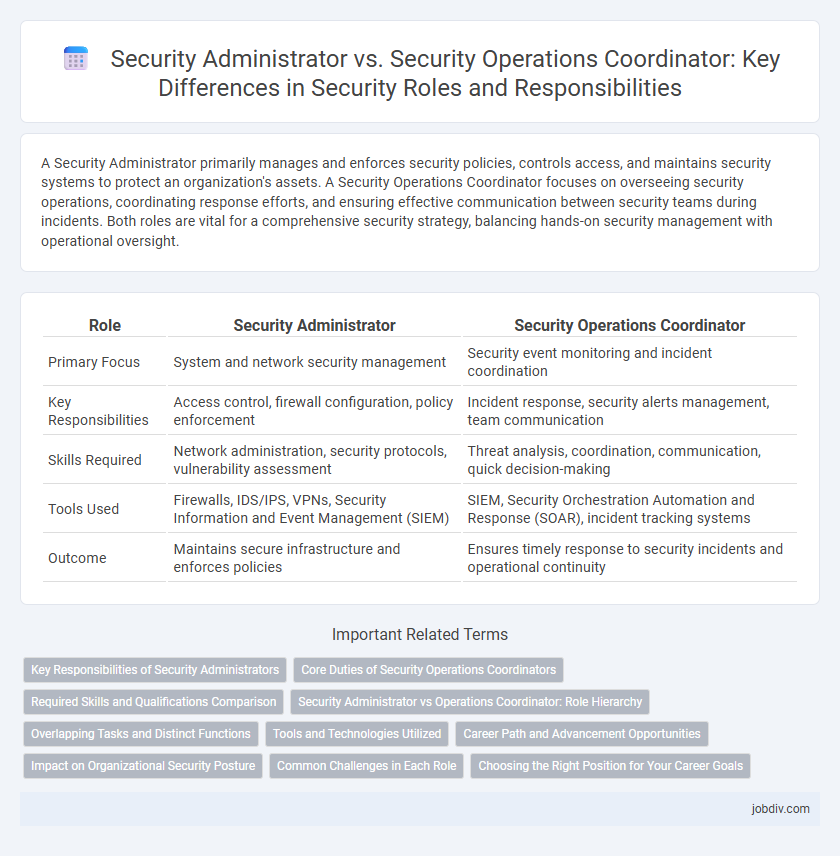A Security Administrator primarily manages and enforces security policies, controls access, and maintains security systems to protect an organization's assets. A Security Operations Coordinator focuses on overseeing security operations, coordinating response efforts, and ensuring effective communication between security teams during incidents. Both roles are vital for a comprehensive security strategy, balancing hands-on security management with operational oversight.
Table of Comparison
| Role | Security Administrator | Security Operations Coordinator |
|---|---|---|
| Primary Focus | System and network security management | Security event monitoring and incident coordination |
| Key Responsibilities | Access control, firewall configuration, policy enforcement | Incident response, security alerts management, team communication |
| Skills Required | Network administration, security protocols, vulnerability assessment | Threat analysis, coordination, communication, quick decision-making |
| Tools Used | Firewalls, IDS/IPS, VPNs, Security Information and Event Management (SIEM) | SIEM, Security Orchestration Automation and Response (SOAR), incident tracking systems |
| Outcome | Maintains secure infrastructure and enforces policies | Ensures timely response to security incidents and operational continuity |
Key Responsibilities of Security Administrators
Security Administrators manage network security by configuring firewalls, monitoring intrusion detection systems, and enforcing access controls to prevent unauthorized access. They conduct security audits, patch vulnerabilities, and implement data encryption protocols to protect sensitive information. Their role includes coordinating incident response efforts and maintaining compliance with industry regulations such as HIPAA, PCI-DSS, and GDPR.
Core Duties of Security Operations Coordinators
Security Operations Coordinators are responsible for overseeing daily security activities, managing incident response protocols, and coordinating communication between security teams and external agencies. Their core duties include monitoring surveillance systems, analyzing security threats, and ensuring compliance with organizational policies and regulatory requirements. Unlike Security Administrators who focus on configuring and maintaining security infrastructure, Security Operations Coordinators emphasize operational execution and situational awareness to maintain a secure environment.
Required Skills and Qualifications Comparison
Security Administrators require in-depth knowledge of network security protocols, firewall management, and incident response, often holding certifications like CISSP or CISM. Security Operations Coordinators emphasize skills in monitoring security alerts, coordinating incident resolution teams, and managing security information and event management (SIEM) systems, typically needing certifications such as CompTIA Security+ or CEH. Both roles demand strong analytical abilities and experience with regulatory compliance frameworks, but Security Administrators usually possess more advanced technical expertise, while Coordinators focus on operational communication and workflow coordination.
Security Administrator vs Operations Coordinator: Role Hierarchy
Security Administrator typically holds a more technical and senior role focused on managing security infrastructure, policies, and user access controls. The Security Operations Coordinator, often positioned at a more tactical or junior level, supports operational tasks such as incident response coordination and monitoring security alerts. Role hierarchy places the Security Administrator above the Operations Coordinator, with the former responsible for strategic security management and the latter executing day-to-day security operations.
Overlapping Tasks and Distinct Functions
Security Administrators manage access controls, enforce security policies, and oversee system configurations to protect organizational assets, while Security Operations Coordinators focus on monitoring security incidents, coordinating incident response, and maintaining communication across security teams. Both roles overlap in threat detection, vulnerability assessment, and incident management but differ in scope, with administrators emphasizing policy implementation and system maintenance, and coordinators prioritizing operational coordination and real-time security event handling. Clear delineation between strategic configuration tasks and tactical incident coordination enhances overall security posture and reduces operational redundancies.
Tools and Technologies Utilized
Security Administrators typically utilize firewalls, intrusion detection systems (IDS), endpoint protection platforms, and security information and event management (SIEM) tools to enforce and maintain organizational security policies. Security Operations Coordinators focus on coordinating real-time monitoring, incident response platforms, threat intelligence tools, and automated alert systems to ensure swift identification and mitigation of security incidents. Both roles require proficiency in regulatory compliance software and network monitoring solutions to maintain comprehensive threat visibility and control.
Career Path and Advancement Opportunities
Security Administrators typically advance by deepening technical expertise in network security, threat management, and systems administration, leading to roles such as Security Manager or Information Security Officer. Security Operations Coordinators often progress through operational leadership, developing skills in incident response coordination, policy enforcement, and cross-team communication, paving the way to positions like Security Operations Manager or Cybersecurity Program Manager. Both career paths offer growth opportunities aligned with increasing responsibility in cybersecurity strategy, compliance, and advanced threat mitigation.
Impact on Organizational Security Posture
A Security Administrator directly manages the implementation and maintenance of security systems, ensuring encryption, firewall configurations, and access controls protect organizational assets, which strengthens the overall security posture. A Security Operations Coordinator oversees incident response workflows, coordinates communication during security events, and monitors threat intelligence to minimize risks and quickly address vulnerabilities. Together, these roles enhance an organization's ability to prevent, detect, and respond to cyber threats, significantly improving resilience against attacks.
Common Challenges in Each Role
Security Administrators often face challenges such as managing access controls, ensuring compliance with security policies, and maintaining up-to-date system configurations to prevent vulnerabilities. Security Operations Coordinators typically struggle with incident response coordination, real-time monitoring of security events, and effective communication between various security teams. Both roles require balancing proactive threat mitigation with reactive measures to maintain organizational security.
Choosing the Right Position for Your Career Goals
A Security Administrator focuses on managing and maintaining an organization's security infrastructure, including firewalls, antivirus software, and access controls, making it ideal for those seeking a technical and hands-on role. In contrast, a Security Operations Coordinator emphasizes coordinating security activities, incident response, and communication between teams, which suits candidates aiming for leadership and operational management in security. Selecting the right position depends on whether your career goals lean towards technical expertise or strategic oversight within cybersecurity.
Security Administrator vs Security Operations Coordinator Infographic

 jobdiv.com
jobdiv.com